Related Research Articles

Edgar Allan Poe was an American writer, poet, author, editor, and literary critic who is best known for his poetry and short stories, particularly his tales of mystery and the macabre. He is widely regarded as a central figure of Romanticism and Gothic fiction in the United States, and of American literature. Poe was one of the country's earliest practitioners of the short story, and is considered the inventor of the detective fiction genre, as well as a significant contributor to the emerging genre of science fiction. He is the first well-known American writer to earn a living through writing alone, resulting in a financially difficult life and career.

"The Pit and the Pendulum" is a short story by American writer Edgar Allan Poe and first published in 1842 in the literary annual The Gift: A Christmas and New Year's Present for 1843. The story is about the torments endured by a prisoner of the Spanish Inquisition, though Poe skews historical facts. The narrator of the story describes his experience of being tortured. The story is especially effective at inspiring fear in the reader because of its heavy focus on the senses, such as sound, emphasizing its reality, unlike many of Poe's stories which are aided by the supernatural. The traditional elements established in popular horror tales at the time are followed, but critical reception has been mixed. The tale has been adapted to film several times.

Edward Montagu, 2nd Earl of Manchester, KG, KB, FRS was an important commander of Parliamentary forces in the First English Civil War, and for a time Oliver Cromwell's superior.
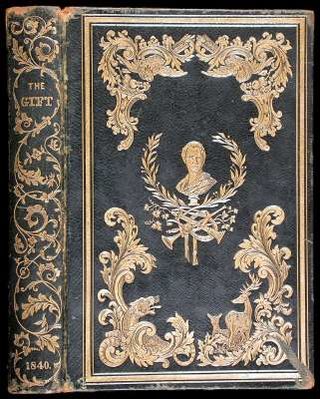
"William Wilson" is a short story by American writer Edgar Allan Poe, first published in 1839, with a setting inspired by Poe's formative years on the outskirts of London. The tale features a doppelgänger. It also appeared in the 1840 collection Tales of the Grotesque and Arabesque, and has been adapted several times.

William Drogo Montagu, 7th Duke of Manchester KP, known as Lord Kimbolton from 1823 to 1843 and as Viscount Mandeville from 1843 to 1855, was a British peer and Conservative Member of Parliament.

"Ligeia" is an early short story by American writer Edgar Allan Poe, first published in 1838. The story follows an unnamed narrator and his wife Ligeia, a beautiful and intelligent raven-haired woman. She falls ill, composes "The Conqueror Worm", and quotes lines attributed to Joseph Glanvill shortly before dying.

Clan Douglas is an ancient clan or noble house from the Scottish Lowlands.

Blackwood's Magazine was a British magazine and miscellany printed between 1817 and 1980. It was founded by the publisher William Blackwood and was originally called the Edinburgh Monthly Magazine. The first number appeared in April 1817 under the editorship of Thomas Pringle and James Cleghorn. The journal was unsuccessful and Blackwood fired Pringle and Cleghorn and relaunched the journal as Blackwood's Edinburgh Magazine under his own editorship. The journal eventually adopted the shorter name and from the relaunch often referred to itself as Maga. The title page bore the image of George Buchanan, a 16th-century Scottish historian, religious and political thinker.
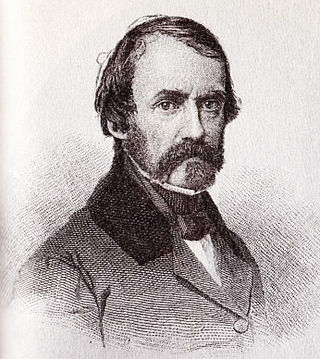
Charles Frederick Briggs, also called C. F. Briggs, was an American journalist, author and editor, born in Nantucket, Massachusetts. He was also known under the pseudonym "Harry Franco", having written The Adventures of Harry Franco in 1839, which was followed by a series of works dealing more or less humorously with life in New York City.
"Metzengerstein: A Tale in Imitation of the German" is a short story by American writer and poet Edgar Allan Poe, his first to see print. It was first published in the pages of Philadelphia's Saturday Courier magazine, in 1832. The story follows the young Frederick, the last of the Metzengerstein family, who carries on a long-standing feud with the Berlifitzing family. Suspected of causing a fire that kills the Berlifitzing family patriarch, Frederick becomes intrigued with a previously unnoticed and untamed horse. Metzengerstein is punished for his cruelty when his own home catches fire and the horse carries him into the flame. Part of a Latin hexameter by Martin Luther serves as the story's epigraph: Pestis eram vivus—moriens tua mors ero.
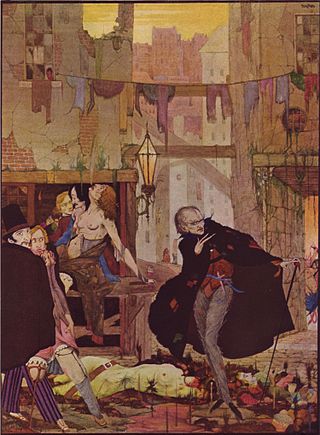
"The Man of the Crowd" is a short story by American writer Edgar Allan Poe about a nameless narrator following a man through a crowded London. It was first published in 1840.

The death of Edgar Allan Poe on October 7, 1849, has remained mysterious in regard to both the cause of death and the circumstances leading to it. American author Edgar Allan Poe was found delirious and disheveled at a tavern in Baltimore, Maryland on October 3. He sought the help of magazine editor Joseph E. Snodgrass and was taken to the Washington College Hospital, where he was treated for apparent intoxication. Poe had no visitors in the hospital and gave no account of how he came to be in his condition before passing away at 5:00 in the morning of the 7th, at the age of 40.

Graham's Magazine was a nineteenth-century periodical based in Philadelphia established by George Rex Graham and published from 1840 to 1858. It was alternatively referred to as Graham's Lady's and Gentleman's Magazine, Graham's Magazine of Literature and Art, Graham's American Monthly Magazine of Literature and Art, and Graham's Illustrated Magazine of Literature, Romance, Art, and Fashion.

American poet and short story writer Edgar Allan Poe has had significant influence in television and film. Many are adaptations of Poe's work, others merely reference it.

George Victor Drogo Montagu, "Kim", 8th Duke of Manchester, styled Lord Kimbolton from 1853 to 1855 and Viscount Mandeville from 1855 to 1890, was a British peer and Member of Parliament.

Tales of the Grotesque and Arabesque is a collection of previously published short stories by Edgar Allan Poe, first published in 1840.

The Avenging Conscience: or "Thou Shalt Not Kill" is a 1914 silent horror film directed by D. W. Griffith. The film is based on Edgar Allan Poe's 1843 short story "The Tell-Tale Heart" and his 1849 poem "Annabel Lee".
Archibald James Edward Douglas, 1st Baron Douglas, was a Scottish politician.
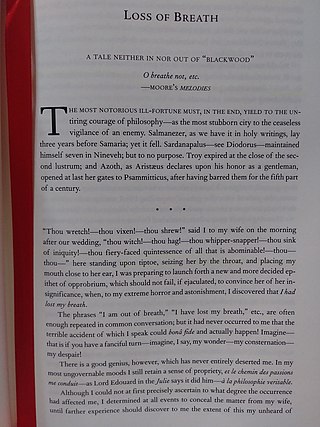
"Loss of Breath", also known as "Loss of Breath: A Tale Neither in Nor Out of 'Blackwood' ", is a short story written by American author Edgar Allan Poe under the pseudonym "Littleton Barry". A satirical tale, the story is narrated by Mr. Lackobreath who recounts his attempt to find and reclaim his lost breath, which he had literally misplaced. Throughout his journey, he is repeatedly dismembered and disfigured, falsely assumed to be dead, hanged, locked away, and prematurely interred. The absurd exaggerations may be explained by the fact that the tale was meant to satirize fiction published in the Edinburgh Blackwood Magazine, which was known for its sensational texts.
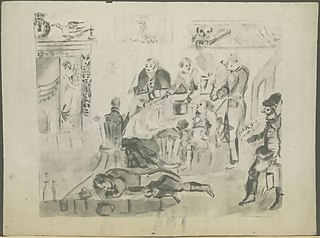
The Delphian Club was an early American literary club active between 1816 and 1825. The focal point of Baltimore's literary community, Delphians like John Neal were prodigious authors and editors. The group of mostly lawyers and doctors gathered weekly to share refreshments and facetious stories, with many of their works being published in The Portico magazine. The club's structure and terminology were inspired by classical antiquity and comical verbosity. Sixteen men claimed membership over the club's nine-year run, with no more than nine serving at a time. Edgar Allan Poe satirized the group in his unpublished Tales of the Folio Club in the 1830s.
References
- ↑ "Mandeville, by William Godwin". Archibald Constable and Co. and Longman, Hurst, Rees, Orme, and Brown. 25 October 1817. Retrieved 7 October 2012.
- ↑ Poe, Edgar Allan. "Loss of Breath", in Tales of Mystery and Imagination. London: Collector's Library, 2003, p. 392. The quote is found in GODWIN, William. A Tale of the Seventeenth Century in England, Vol. 3. Edinburgh: Archibald Constable & Co, 1817, p. 49